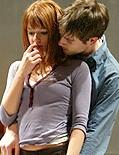SEARCH CurtainUp
REVIEWS
FEATURES
NEWS
Etcetera and
Short Term Listings
LISTINGS
Broadway
Off-Broadway
BOOKS and CDs
OTHER PLACES
Berkshires
London
LA/San Diego
Philadelphia
Elsewhere
QUOTES
On TKTS
LETTERS TO EDITOR
FILM
LINKS
MISCELANEOUS
Free Updates
Masthead
NYC Weather
Juvenilia
|
Sometimes I get so tired of irony. You know that voice. That gently mocking, been there, done that voice --- Henry I haven't really been anywhere or done anything so I don't even try for the voice ---Angie Nobody has been or done as much as they pretend to, you know? ---Henry |

Aubrey Dollar & Luke MacFarlane
(Photo: Joan Marcus) |
Henry, Brodie and Meredith, for all their smart repartee are obviously bright enough to also live up to that "puberes ex pueres" and give up the cruel gamesmanship that only shows them up as being their own worst enemies. However, it's hard to believe that this could happen in the course of the single Friday night during which the bored threesome decides to manipulate a naive fellow student -- Angie, a religious African-American -- into a "three-way" with Henry and Brodie as Meredith watches. While we know a lot more about what lies beneath the oh-so cool, pretend done-it-all exteriors, these students could do with some professional counseling, especially Meredith and Brodie.
The scheme to seduce the good Christian girl doesn't add up to much of a plot and it's a rather foregone conclusion that the players will prove to be considerably less cool than they pretend to be. McLeod does manage to touch on universally interesting issues of dealing with youthful uncertainty, insecurity and grief via random sex, alcohol and emotional cover-up. Since she is a resident playwright at Kenyon College in Ohio (which could easily be the model for Juvenilia's Jubilee College) her dialogue is also authentic enough to sound as if it came straight from current collegians' mouths. It's too bad that most of it focuses on who could have, would have, should have and did have sex with whom. Even with a cyber-sex girl friend named Tiffany thrown in, this tends to wear thin. Fun and authentic as the dialogue is, one can only hope that the callow, shallow characters speaking it are invented.
Angie, the Christian girl who almost falls in with the three campus musketeers' sex game, is the play's most sympathetic if not its most believable character. The one most likely to abandon juvenilia is Henry, the philosophy major and president of "Consume with a Conscience." Even he has a way to go. Though at play's end he's gotten off his stationary bike (translate that to go-nowhere), he's still hesitating to move out of the doorway of his dorm to follow up on the promise of getting to really know Angie.
Director David Petrarca elicits some fine performances from the cast, especially from the two men, both of whom are somewhat reminiscent of the two post-college guys in Kenneth Lonergan's This Is Our Youth. Luke MacFarlane is convincing as the dangerously alcohol prone, campus stud and Ian Brennan is endearing as the more sensitive, sexually insecure Henry. The two women have a more difficult time with the nuances of their personalities -- Erika Tazel in maintaining Angie's purity even though she's not the innocent her dorm neighbors envision, and Aubrey Dollar in toning down Meredith's overall acerbic outrageousness to let the grief over her mother's death surface.
Michael Yeargan's gray set efficiently serves as both Henry's to Angie's dorm and is effectively lit by Mark McCullough. Martin Pakledinaz costumes are colorful and snappy. Though director David Petrarca does his best to keep things moving, this Friday night often seems like a whole weekend. Despite the good performances, none of the characters attain memorable status and Jubilee College comes off as an unlikely first choice for high school seniors shopping for a place with an interesting and likeable student body.
|
JUVENILIA.
Written by Wendy MacLeod Directed by David Petrarca Cast: Ian Brennan, Aubrey Dollar, Luke MacFarlane, Erica N. Tazel. Set Design: Michael Yeargan Costume Design: Martin Pakledinaz Lighting Design: Mark McCullough, Sound Design: Rob Milburn and Michael Bodeen Running time: 2 hours, includes one intermission Playwrights Horizons, 416 W. 42nd St. (9th/10th Aves)212-279-4200 www.playwrightshorizons.org 11/14/03 to 12/21/03; opening 12/07/03. Tue - Sat at 8pm; Sat, Sun at 3pm; Sun at 7:30pm --$50 Reviewed by Elyse Sommer based on December 7th press performance performance |

Mendes at the Donmar
Our Review

At This Theater

Leonard Maltin's 2003 Movie and Video Guide

Ridiculous!The Theatrical Life & Times of Charles Ludlam

Somewhere For Me, a Biography of Richard Rodgers

The New York Times Book of Broadway: On the Aisle for the Unforgettable Plays of the Last Century

6, 500 Comparative Phrases including 800 Shakespearean Metaphors by CurtainUp's editor.
Click image to buy.
Go here for details and larger image.



